A Conversation With Lev Raphael
by Claire E. White
Lev Raphael was born and raised in New York City, the son of Holocaust survivors. He did an MFA in Creative Writing at the University of Massachusetts at Amherst where he won the Harvey Swados Fiction Prize, awarded by Martha Foley
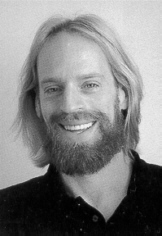
|
Raphael's literary fiction and creative nonfiction have appeared in two dozen anthologies in the U.S. and Britain, most recently in American Jewish Fiction: A Century of Stories, which includes work by Saul Bellow, Cynthia Ozick, Allegra Goodman and other luminaries. He is a winner of Amelia's Reed Smith Fiction Prize and International Quarterly's Crossing Boundaries Prize for innovative prose, awarded by D.M. Thomas. Raphael has also published dozens of stories, essays, and articles in a wide range of newspapers, magazines and journals.
An "escaped academic," Raphael is also the author of three satirical academic mysteries: Let's Get Criminal (St. Martin's Press, 1997), The Edith Wharton Murders (St. Martin's Press, 1998), and the just-released The Death of a Constant Lover (Walker & Co., 1999). Marilyn Stasio of the New York Times Book Review has praised his "marvelous recall of the entertaining world he left behind." Raphael writes the "Mysteries" book review column for the Detroit Free Press as well as reviewing other fiction and nonfiction there; is the book critic for NPR's Todd Mundt Show; regularly reviews for Jerusalem Report; and has just begun reviewing for the Washington Post. He is highly-regarded as an entertaining and informative speaker, and has done well over 100 invited readings from his fiction and nonfiction in North America, Europe, and Israel at colleges and universities, writing conferences, synagogues, and book fairs. Featured in two documentaries, he has been a panelist at London's Jewish Film Festival. His stories and essays are on university syllabi around the U.S. and in Canada; his fiction has been analyzed in scholarly journals and at conferences in the U.S. and abroad. Raphael holds a Ph.D. in American Studies from Michigan State University, where he taught Creative Writing and other courses. He writes and reviews full-time.
When he's not writing or doing speaking engagements, you can find him working out at the gym, updating his very entertaining website, whipping up a gourmet meal or jetting off to France for a well-deserved vacation. We caught up with Lev just as he returned from his recent book tour. He talked with us about his latest book, The Death of a Constant Lover (which is receiving rave reviews from everyone from The New York Times Book Review to the Washington Post), what's new in the mystery business and even gives some helpful tips for beginning writers.
When did you first know that you wanted to be a writer?
I fell in love with story-telling in kindergarten and first grade because my mother read to me, and because I was so taken by visits to our local library for "story time." This library was in an old Gothic-style building, cool, hushed, a palace of books. Every time I open up a hard cover book, I return to that sanctuary and feel the same sense of peace mixed with excitement. I don't recall specific fantasies of "being a writer" vs. writing until I was in college and had already been writing fiction and poetry for quite a few years. But I suppose that unconsciously, I wanted to enter the world of books as more than just a "tourist."
What do you love most about writing fiction?
The intensity of it, the sense of being taken over by a story, an idea, characters, a scene. Writing is entering a different level of consciousness and I often feel I'm floating inside what I'm writing, surrounded by it. Like a great, long, leisurely swim where there's no separation between you and the water, where the effort is so invigorating it doesn't feel like effort, but boy, are you moving!
I'd like to talk about your career as a book critic. How do you pick which books you review?
Snazzy covers help. Seriously, for the "Mysteries" column in the Detroit Free Press, I pick among books my editor, publishers, and even authors send me, trying to find books that can be organized around a theme like "amateur sleuths" or "foreign settings" or "legal thrillers" for example--and of course the publication dates have to match. I like to balance books between big and small presses if I can, and between well-known and lesser known authors. Sometimes I'll ask a publisher directly for a book if it fits, or if I'm just curious and trying to decide. But the key thing is always whether the opening pages of a book grab me, or if the subject does enough for me to give a so-so opening some time before I make up my mind. In my reviewing for NPR's Todd Mundt Show, I try for a variety of books: mysteries, biography, cultural history, literary fiction--whatever strikes me as intriguing. So I've recently reviewed John Updike's new book as well as King Leopold's Ghost, about the rape of the Congo. Reviewing for the Washington Post and the Jerusalem Report is very different because the editors assign me books, but the advantage is that I get more space than I typically do in the Free Press.
What trends have you noticed in the mystery genre lately?
Maybe a mini-trend in transplant thrillers: books where a mystery grows out of someone's response to a heart or other transplant, Edna Buchanan's Pulse and Michael Connelly's Blood Work come to mind. I also see many more mysteries by African-American women and men, and a steady stream of southwestern mysteries.
As a reviewer, what really bothers you in a mystery? What really turns you off?
Bad writing, especially on the first page. Sentences like "I held the Complete Works of Sherlock Holmes in the forefront of my mind." Or "His hair was cropped close to his head." They demonstrate sloppiness in the writer and the editors or copy editors and make me suspect how well the book is put together. I also dislike obvious clues, like one in a recent bestseller that made me moan with disappointment because for 300 subsequent pages there wasn't enough suspense left.
Has being a reviewer affected your writing in any way? How so?
Reading lots of thin mysteries has made me more determined to see that my series is rich with texture and psychological depth. I'm writing novels about murder and its detection, not genre mysteries. I don't mind reading genre mysteries, but writing one wouldn't be rewarding for me personally.
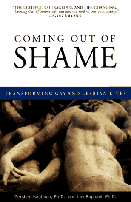
|
My partner and I have taught together and co-authored several books. Since he's an expert in shame theory, we felt it would be valuable to apply this work to the gay and lesbian experience and offer it to the community.
What kind of reaction to the book have you received from readers?
Heartfelt and moving fan mail from people who feel we've given words to their inner experience.
Let's turn to your mystery series starring amateur sleuth Nick Hoffman. How did the series first come about?
Before the series, my fiction was primarily about children of Holocaust survivors and, understandably, rather dark. It bothered me, though, that my humor wasn't finding an outlet in fiction so I was looking for a venue, so to speak. I'd loved mysteries in high school (Agatha Christie, John Creasey), but didn't feel ready to tackle this very challenging genre until after I'd published a few books and become established as a writer. I was most impressed by one comic mystery writer, Phoebe Atwood Taylor, who was very big in the 1930s and 40s, and I read everything of hers I could find back then, both in her series starring a Shakespeare look-alike, and in her Cape Cod series. I thought if I'd write a mystery, it would have to be comic, so the two different desires flowed together and gave birth to the Nick Hoffman series. They say write what you know, and I knew the academic world very well after 13 years of teaching, so the setting was obvious.
How much of Lev Raphael is there in Nick? Are you as good a cook as he is?
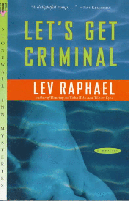
|
Although the protagonist of the series is gay, I admit I never think of the series as a "gay series"--I think of it as a mystery series which happens to have a gay sleuth. But I notice that in some of the large chain bookstores, the books are not found in the mystery section, but in the Gay Literature section. What's going on here? Where do you think your books should be shelved in the bookstores?
Well, you're right. It's a comic academic series that should be in with other mysteries, or even novels since I'm in the tradition of Kingsley Amis and David Lodge. The books are mis-shelved because of laziness and lack of insight or imagination, to put it bluntly. It's very frustrating, but that's something authors have absolutely no power over. Lots of bookstores do get it right, though, and the New York Times Book Review knew what it was doing when it reviewed The Edith Wharton Murders and focused on the academic satire.
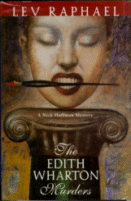
|
Oh, yes. Conferences can be very funny, very odd. A circus without the tent or cotton candy. In the first book, Let's Get Criminal, Nick actually suspects Stefan of murder, which made his involvement in sleuthing natural; in the second, I wanted the murder to be related to something Nick holds dear, in this case, it's his Wharton scholarship and a conference he's trying to organize, even though he was bullied into it.
The latest book in the series is The Death of a Constant Lover. This book seems to have a slightly "darker" feel to it than the first two books in the series. Was that planned?
Yes. Anyone would grow more thoughtful and puzzled by facing death so often. I dislike mysteries where a body's discovered and then they all go out to Denny's and you have no sense of the *impact* of the discovery. Think of a time when you've seen a terrible car accident. It haunts you--you imagine what it would have been like if someone you loved were involved. You can't shake it. So why should Nick not be affected by the murders he's encountered?
Another interesting element of the stories is that Stefan, who is Jewish, was actually raised as a Christian by his parents, who hid his religion from him. What gave you the idea for that piece of background? How does this fact color Stefan's view of life?
Stefan appears in my literary novel Winter Eyes (1992) and on tour for two years before that I'd met a lot of people who'd had their Jewishness hidden from them by their parents, for various reasons. It's a devastating experience, and I felt I had to pay tribute to their suffering in some way, so that became a major strand in the novel as I reworked it. That past has helped make Stefan sometimes rather gloomy and serious, but it also shields him from the kind of shock Nick feels around injustice and violence.
The books are also known for their hilarious portrayal of life in the halls of academia. Does writing satire come easily to you?
I've always had a skewed vision of the world, and have admired satirists (from junior high on) like Dorothy Parker, Thurber, SJ Perelman. But satire's easy when you write about academia. What a split: on the surface you have high-minded rhetoric about service and students and learning, and underneath is a ferment of pettiness, jealousy, murderous rage and envy. I think of this world as having the morals of the Mafia, the greed of Big Business, the vanity of Pro Sports, and the hypocrisy of Politics. Think of this world as Alice in Wonderland meets Mutiny on the Bounty.
I believe a satirist has to be an excellent observer of human nature. Since you began the series, have you noticed people acting nervous around you at, say, cocktail parties? :)
Quite the opposite. People want to furnish me with material for the next books, and I get deluged with anecdotes about skullduggery at various schools. I could use a personal assistant to keep track of all the gossip!
One of the problems with a series that features an amateur sleuth is the fact that the author has to find some explanation for the fact that dead bodies constantly turn up around this person. I mean, who in his right mind would really want Jessica Fletcher coming to visit? It struck me as really funny that Nick has started to notice the phenomenon and it's really beginning to worry him. Was it a difficult decision to choose how to handle this issue in the books? I have to admit, I feel very stressed about whether Nick is going to get tenure or not.
Be prepared for a real surprise about Nick's tenure when the 4th book comes out next year. Nick wouldn't be a substantial character if he wasn't changed by, worried by, what's happening around him. The irony is that he grew up in New York and was never even mugged, and here he is in the bucolic Midwest encountering murder rather regularly (in every book). So it's funny, but it's also real. And let's face it, academics try to maim and kill each other all the time, only with different weapons and different targets.
If you were casting the roles of Nick and Stefan for a feature film, who would you choose for the parts? For Sharon?
Ken Olin for Stefan, and Kevin Bacon for Nick: he's got the right hair, right smile, right cockiness, and would probably enjoy putting on a few pounds for the role. And picturing him in scenes with Ken Olin--perfect! Perhaps Jane Seymour for Sharon. Who do you see playing those parts?
Well, I really feel that Nick is a blond. Kevin Bacon sounds good. But I think Hugh Grant has the right look. Stephan is dark, handsome and brooding, to me. Ken Olin works. I like Jane Seymour for Sharon.
What kind of response did you get on your recent book tour?
The kind of a response that you dream of for a book. People read
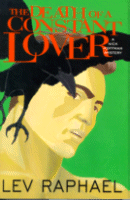
|
And everyone expects you to be very up, and have something witty to say.
Right, Exactly. And since my reputation proceeds me sometimes, I can't be dour and grumpy.
You can't sulk.
No, no sulking.
Maybe if you were on tour for a literary novel you could.
Yes, I could. Raphael will not shine tonight. All you get is a dull glimmer. I'm lucky it was only six cities, because Martha Lawrence lives near San Diego and I actually had free time and we got together for lunch. She said that she did nine cities recently and after a certain point you get the tour meltdown. You can't take being in yet another hotel room by yourself at the end of the day, with your computer or your journal or a book or room service or a cable TV. I said, well I'm almost there. I'm almost at meltdown.
Anything strange happen to you on the tour?
Oh, yes. Like the cab driver who got me at the airport in Phoenix who took me to Mesa instead of Scottsdale because both places had a Main Street. Well, you know, my feeling is almost every city in America has a Main Street. I was just so appalled. I didn't have a telephone with me. I had to get out and call to tell Poison Pen that I was going to be late. I always make a really big effort to get every place early, and so this is really not like me. Not only did the cab driver get lost in Phoenix, but when I finally checked into my hotel, it was right next to "crack houses," according to a second cabby who said the neighborhood would be better "in about five years." The 13-year-old at the desk had incomplete records; when I tried to make a long distance call from my room they claimed at the desk that I wasn't authorized to; when I decided to take a hot bath to relax, there was frantic pounding on the door and I thought it must be a fire or some other disaster. Turns out they were having trouble with my message system, and fixing it involved walkie talkies and ten minutes of confusion while I stood there in my towel, dripping onto the carpet. As they say about touring in "A Little Night Music": "Hi-Ho, the glamorous life!" Then there was some mistaken tourist information in Los Angeles and I ended up going to the wrong train station. That worked out okay, but these are the kind of things that you hope don't happen because you need to be as relaxed as possible and sitting there thinking, "Oh, My God I'm not going to make it!" doesn't really calm you down.
Did you do any readings or did you just sign?
I did a lot of readings. In fact, it was mostly readings and only one or two signings. I prefer readings because it gives me a much greater chance to interact with the audience and for them to get a feel for what the book is like. I mean the cover is gorgeous and everyone loves that, but you've got to get a taste for the book. I love readings. And I must say, I'm a great reader! I've done well over a hundred readings in the last few years around the country and in Europe and in Israel, and I love it. I get to use my teaching background and my theatre background. It's just great. I don't wear costumes, but it's a performance. I perform a part of the book and I try to make it alive as possible, as opposed to a grim reading of the Congressional Record.
That's quite interesting, because not all authors are very comfortable with live readings, actually. In fact many of them are very uncomfortable with it.
The problem in the business is that many, many people get into it not realizing that not only is your book or your series a commodity, but you yourself are a commodity. And if you struggle against that or are not comfortable with that then that makes it a lot harder when you're in that position. But if you embrace it and say, "Yes, I'm out here and here's my book!" it will be easier. It's more elevated then a few generations back when American Jews were on the lower East Side with pushcarts selling their wares. It's a little more elevated than that. (laughs) But it is doing retail. I mean it's not snake oil, because it's a product that can actually do good for people. But it's hard. It is really hard, and I think not enough authors going into it realize that to make a book successful you really have to be involved in it at the publicity level.
I think many authors are very shy.
Well, of course, that's why they're writers. I think the best book of any psychologist ever about the art of writing, is Art and Artist by Otto Rank. I think this is true for people whether they are introverted or extroverts. He's the therapist who trained Anaïs Nin. He says artists are perpetually at war with life because they need it to create, but they need to withdraw from it. They need it for material, but to create they have to withdraw from it. So they are going back and forth constantly, and they have this conflict. I feel it because I think, "God, I don't want to have another book out next Spring because it means I'd have to be touring again." I'd like to wait. I also need time to write, which is hard when you're touring. But I'm already starting to book up for events in the Fall! Because stuff of mine is taught at universities, a lot of universities bring me in to speak. So I'm speaking at Emory in the Fall, and at a SUNY campus. A bunch of Jewish book fairs are going to bring me in November, which is Jewish Book Month. And somebody was talking about an event at Tucson in the Winter. Every week that you're gone is at least two weeks out of your schedule because it's the time beforehand and the time recouping afterwards. You know, sort of getting back into the stream of your life. Like, for instance, I haven't written anything since I've gotten back. I've been telling my tour history, answering my mail, answering email, keeping track of all my new reviews. I'm still not back to where I was before the tour.
Are you the kind of writer that finds those kind of interruptions very jarring?
Yes, I think I do. Jarring isn't the right word for me though, because I love it. I love doing it. I just have learned to acknowledge that I'm going to need plenty of down time when I come back, so I build it in.
I'd like to talk a bit about your teaching career. Tell us a little bit about that. How did you end up in that career?
I had two loves when I was in college. One of them was writing and one of them was teaching. My mother was a teacher, her father was a teacher before her and my mentor (obviously) was a teacher at my undergraduate school. I thought it was great. I really wanted to do it. I wanted to write at the same time. These both were my career paths. I did it for thirteen years until I knew that there was no way I was going to publish books which required much more time to put together. Unless I left. I taught creative writing, I taught composition, I taught a course in short story and drama. I taught a course on Henry James, I taught Holocaust literature, I taught Jewish American fiction. But mostly a wide variety of writing courses and introductory lit.
What did you enjoy most about teaching?
I loved being able to share my excitement about an idea or a writer. I think that the greatest thing about teaching is transmitting your excitement. One of the best courses I taught (and that was the most fun for me) was a short story course where we read writers who were some of my favorites in the short story arena: D. H. Lawrence, Henry James and a whole bunch of experimental fiction writers. The class was great because I was so high the whole time I was teaching it. Instead of working from someone else's syllabus from higher ups in the department, I was just teaching exactly what I wanted to teach. So, I think it's sharing excitement and seeing somebody grow and change. I just taught at The Green River Novels in Progress workshop. I did a mystery writing workshop. It was great.
What are the most common mistakes that you see beginning fiction writers make?
It will make you laugh. Vomit. V O M I T. Seven manuscripts, four of them had characters vomiting when they
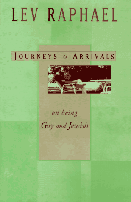
|
Do you ever miss the academic life?
The life, no. The students, yes. It was really wonderful the times I've had the opportunity to interact with students and teach writing workshops have been great. That's what I miss. But not so much that I'd even want to do a whole semester some place. I think now that I'm starting to teach writing workshops I'd like to do maybe one or two a year. Maybe one in the Summer some place. But even one a year would be very exciting. Because it confirms some of those things I believe about teaching.
Can you give us a hint about the next Nick Hoffman book? Have you started it yet?
Yes, the outline is completely done. And by outline what I mean is it's almost a hundred pages. It's sort of the dehydrated book: Just Add Water and Stir. It's a condensed version of the books. Its got every major scene, dialogue exchanges, some of the meals, what people are wearing. It's the entire book laid out scene by scene. I find it very helpful to do that rather than a bare bones outline. So that my editor knows exactly where the book goes and when and so does my agent. Yeah there is more trouble ahead for Nick. Some very bizarre developments about his tenure. A freaky university wide initiative. One of the minor characters in the current book becomes very significant in Nick's life. I won't say any more. Maybe even more academic satire then before. That's just going to keep building. It's funny: somebody online on Amazon.com said that I don't quite approach the comic brilliance of Elmore Leonard, and said I should handle my food the way Janet Evanovich does in her series. Burgers, cheese, peanut butter out of the jar. You know, I don't write even remotely like Elmore Leonard!
That's so bizarre. I'm trying to picture Nick doing that and its not coming into focus.
It would be time for electroshock therapy if Nick's eating peanut butter out of the jar or tuna fish out of the can! We'd know we were in trouble.
We've talked about the inside of the book, now let's talk about the outside. You've had really interesting cover art on your books and I know its two different publishers. How did each of your publishers on this series approach the cover art? Were you consulted?
Well, I got tremendous consultation. The contract actually called for "meaningful consultation." That's the big plus. Walker is a very personable firm to work with and is absolutely extraordinary helpful. Helpful, warm and responsive. I saw the art and I loved the idea of it. I loved that the figure had a sneer on his face. I was thrilled. I was talking to my editor about it and I had a few comments and he said, "Would you like to speak to the art director?" For a moment my mind went blank, because I didn't know you were allowed to speak to the art director. (laughing). I said I would love to. We had a fabulous conversation about cover art. Actually we talked about artists, cover artists that we enjoyed and different companies and different looks and things. I gave her a handful of comments about ways in which I thought the cover should be tweaked. Well, they took all my suggestions, and the art directors thanked me for my enthusiasm and my input. I tell you every single contact person on the tour raved about the cover. And raved about Walker in terms of their helpful and efficient publicity department. So that made me feel doubly proud. Not only did they produce a beautiful book but they really are in the old fashioned since of the word "publishing it well".
Ok, it's time to tackle a raging grammatical controversy. Are you up for it?
I can do it.
The issue is whether or not you can use the word "their" to refer to a singular antecedent pronoun of undetermined gender. "Will everyone please take their seat," instead of "Will everyone please take his seat." Or even, "Will everyone please take his or her seat." Of course, everyone uses "their" when speaking. But most American grammarians balk at this usage, claiming that "their" is plural and that "his" is the correct word, based on the rules for Latin grammar. Feminists get quite angry about this and believe it's sexist to always use "his." I did some research on this. Jane Austen used "their" in this context quite often, as did Shakespeare. Apparently, it is only a modern phenomenon to restrict the word "their" to a singular meaning. There is an interesting website devoted solely to this very topic. Patricia O'Conner, who wrote Woe is I, is opposed to "their." What do you think?
This is what I think I'd tell my students. First of all, I think people need to know what the controversy is and why so that they understand what choices they make. I'd say well, it depends on your audience. You may want to pitch what you write depending on your audience. Because the easiest way to get out of this is instead of saying "Each citizen should have their right." You could say "Every citizen. All Citizens. Citizens." Change it to plural if possible.
So, dance around the issue? Avoid it?
Well, that's one way to do it. As I said, you have to be aware of your audience. Unless you are writing very formally,
| "If somebody made me write according to a schedule it would be like being trapped at an around the clock performance of River Dance. I write when I write... I work on stuff in my head, when I go in a car trip, when I'm off on a movie. Things are always cooking at some level. So I couldn't be an executive writer because, as Lawrence says, that would kill the living heart of me." |
I can remember assigning a freshman comp assignment. You know, write a personal essay. They said, "How do I write this and not use the word "I"?" I said, "That's a really good question." Because they had it drummed into them that you must never use the word "I". Having seen two kids through high school, I finally saw the other side of it. I watched them learn the wrong way to write. I saw people teach them incorrectly how to write, so we've always worked on two tracks. This is what your teacher wants and this is what you need to know for college. You're making a choice. We do that all the time. But I don't like being criticized when I've made the choice.
How do you like to work best -- to create?
Madly and passionately with the Rite of Spring blasting in the background. I offer my work as a sacrifice to the Gods of Creativity.
Do you like to write everyday? Are you the executive writer -- do you write 9 to 5 with a break?
If somebody made me write according to a schedule it would be like being trapped at an around the clock
| "I loved being able to share my excitement about an idea or a writer. I think that the greatest thing about teaching is transmitting your excitement... it's sharing excitement and seeing somebody grow and change." |
What is the greatest challenge you've faced as a mystery writer?
Getting the 1st book published! Because I was well-known for my literary fiction, some editors thought I was stepping down, wasting my talent in a mystery. It struck me as pretty bizarre, especially since I'd written across genres for years, and still do: memoir, literary criticism, psychology, etc. And besides, it's my time, right, so who has the right to tell me I'm wasting it?
What is your advice to a Professor of Rhetoric who wants to leave university life behind to become a famous novelist?
To paraphrase what Somerset Maugham says in Cakes and Ale, a classic satire of the writing life: plan to live a very long time, well past your rivals, and keep churning out enough books so that you'll end up being venerated for your longevity and your output.
Return to the May 1999 issue of The IWJ.
More from Writers Write
